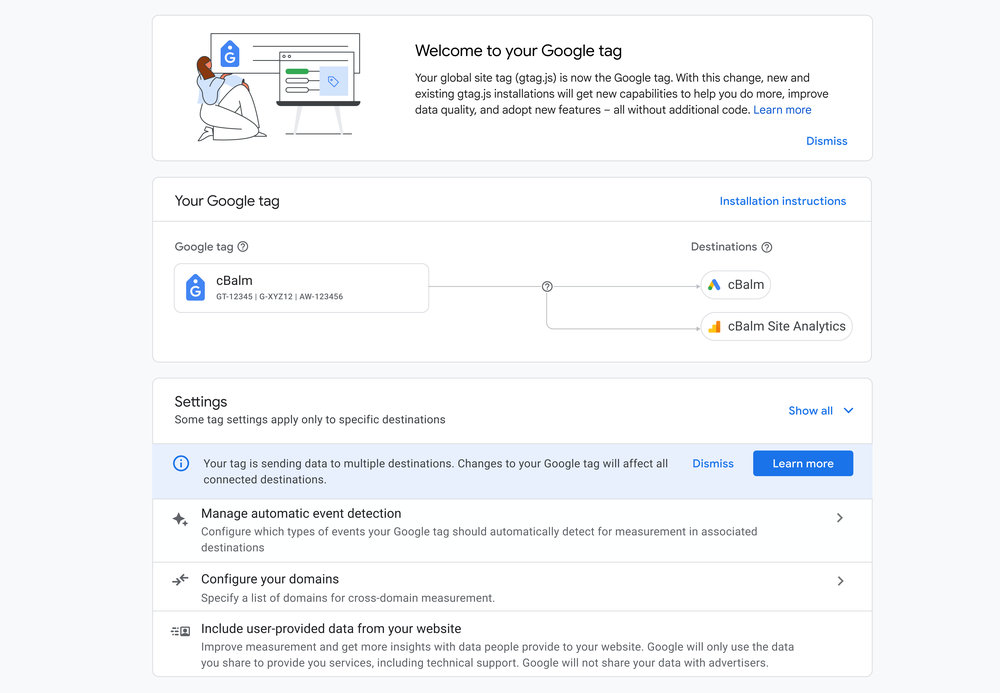For businesses in 2022, digital marketing measurement and evaluation are a significant headache.
As the online privacy net tightens, digital channels have less data to play with and several more hoops to jump through to link cause and effect, resulting in an increasingly complicated and convoluted reporting landscape.
New and updated measurement tools are proliferating, such as Google Analytics 4 (which takes over in July 2023), aggregated web events and the Conversion API (CAPI) within Meta. Not to mention Google automatically shifting businesses’ attribution models – without asking…
However, in a rare moment of simplicity, Google has announced an expansion and rebrand of its existing global site tag, making it easier to use and more powerful for marketers.
The global site tag (gtag.js) lets advertisers send event data to Google Analytics, Google Marketing Platform and Google Ads, but it has been due an upgrade.
Scott Herman, Google Group Product Manager, Tagging
“Measurement is the bedrock of digital advertising. Accurate measurement relies on robust tagging to help you reach people who have visited your website or app… It’s critical that advertisers have durable, sitewide tagging in place as legacy identifiers such as third-party cookies are phased out.
Today, we’re further improving the tagging experience with the new Google tag — a single, reusable tag built on top of your existing gtag.js implementations that helps you confidently measure impact and preserve user trust.”
The new Google Tag promises easier implementation, consolidated tracking, richer insights and, hopefully, a lot less coding.
What is the Google Tag?
For those unfamiliar, the Google tag is a bit of code you add to your website.
It lets you send data from your website to linked Google products, such as Analytics or Ads, to help measure the effectiveness of your website or ads.
The Google tag has an ID that lets you use one single tag across all of Google’s products. So, instead of managing lots of different tags for different Google product accounts, you can use one tag and connect it to multiple destinations.
Essentially, a tag is a code that makes the measurement of data possible so that brands can look at it and learn actionable insights.
It already works with Google products such as Google Ads, Campaign Manager, Optimise, Display & Video 360, Search Ads 360 and Google Analytics. More products may be in the pipeline.
One Tag to rule them all! Well, Google properties that is
Christophe Combette, Director, Ads Measurement Products, Google via Search Engine Land
“Google tag is – at its core – one tag. For example, if an advertiser has two Google Ads accounts, they only need to tag once, where previously multiple tags would have been needed. This works the same for an advertiser who uses both Google Ads and Google Analytics.”
One of the new changes is centralised sitewide tagging. Advertisers with multiple gtag.js tags can combine them and manage their settings in the Google Tag screen in Google Ads or Google Analytics.
Google says it will make it easier to set up sitewide tagging so that marketers can combine or reuse tags easily, improving measurement and leading to better quality customer insights. User access to tag settings can also be managed better.
The setup promises to be faster, too, as Google says it has “simplified complex workflows for a simple and quick setup experience that works across Google Ads and Google Analytics.”
Additionally, customers using popular content management systems can install a Google tag without using any code.
Scott Herman, Group Product Manager, Tagging, Google
“The Google tag is a new centralised approach to tagging, integrated with many of our other privacy solutions to give advertisers more control and ease of use. As with your existing gtag.js and Google Tag Manager implementations, the Google tag continues to work well with solutions such as Consent Mode and Server-Side Tagging.”
More codeless features mean that brands can set up several events without having to set up new in-page coding – which will save time and money for advertisers. Finally, a Google tag will only need to be installed once, even if you’re using two or three products.
Create actionable insights
According to Google, there are several benefits.
You can use multiple tags to get better data and manage them in one place, and you can manage user access to give you more control over who has access to measurement settings.
The Google tag builds on the work the global site tag did. It’s more efficient and easier to use – but marketers who are still using the global site tag don’t need to make any changes right now.
In fact, global site tags will have new capabilities available to them, so marketers can look at adjusting settings to take advantage of that.
The old global tag site will be rebranded, but there’s no word yet on when it might go away.




RECOMMENDED FOR YOU
Instagram Threads Tops 150m Users, Ads To Launch In 2024
Threads, Meta’s Twitter-like social media app, continues to show…
Threads, Meta’s Twitter-like social media app, continues to show…
Google Once Again Delays Ad Cookie Cull
Google has announced another postponement in the removal of…
Google has announced another postponement in the removal of…
Meta Bets Big on Meta AI
Meta has recently amplified its role in the generative…
Meta has recently amplified its role in the generative…